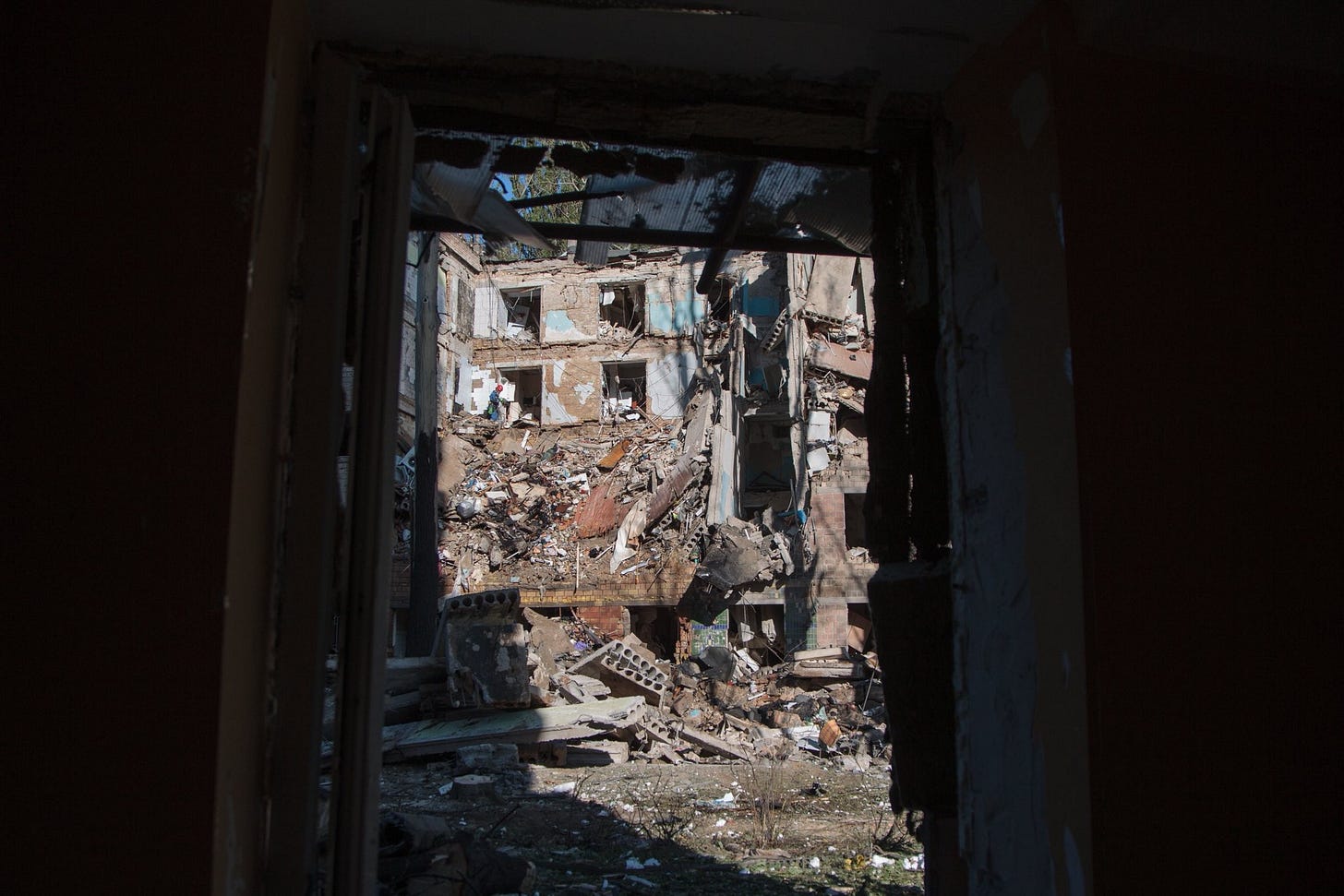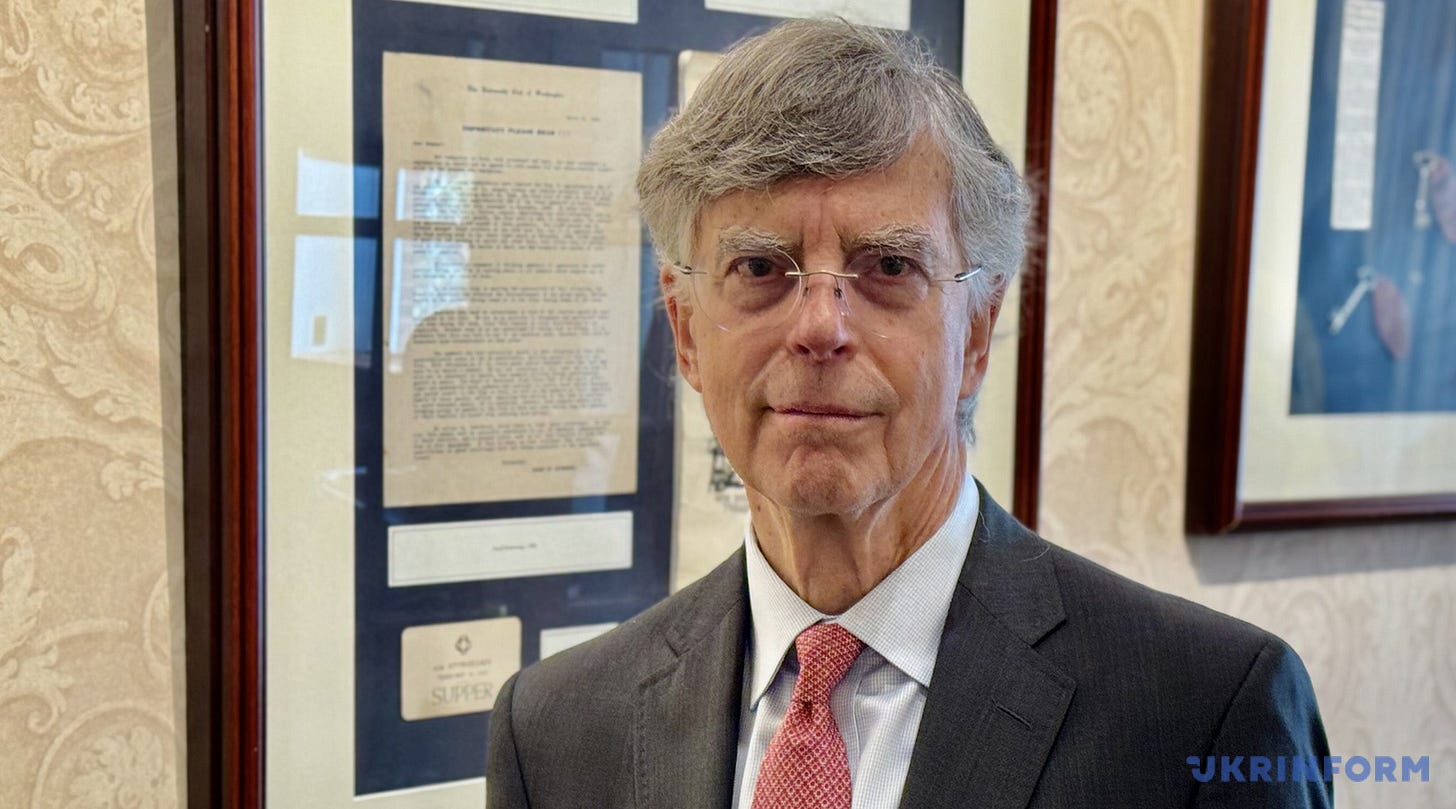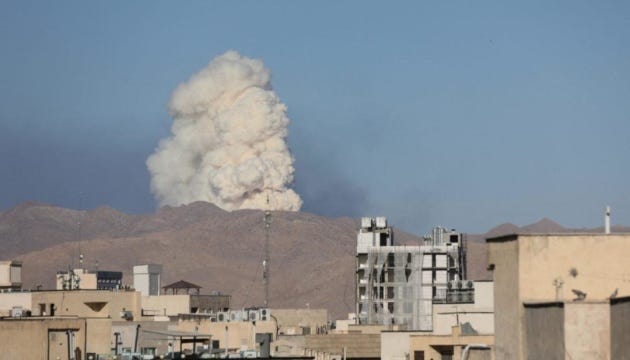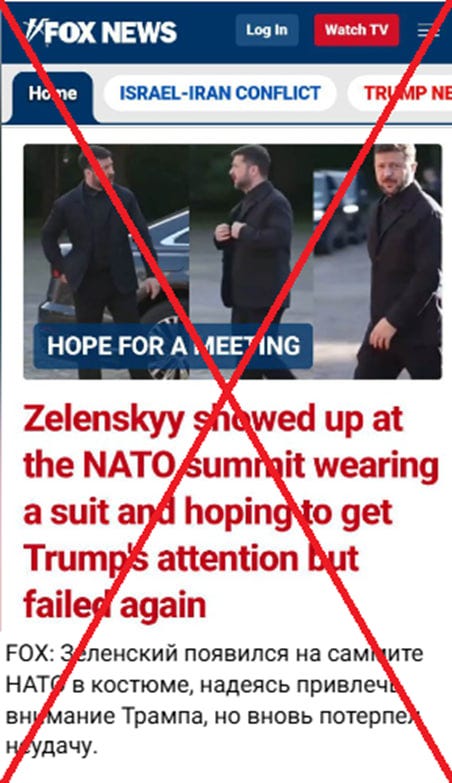Weekly Exclusives
Weekly Exclusives - a newsletter that contains author publications, interviews, exclusive comments, photos and videos.
A high-rise building destroyed by a Russian missile in the Shevchenkivskyi district of Kyiv, June 23, 2025
Interview
William Taylor, former U.S. Ambassador to Ukraine
A just and lasting peace in Ukraine can only be achieved by exerting sufficient pressure on the Kremlin — pressure strong enough to compel it to end the war. In addition, there must be guarantees that Russia will not invade again. Despite repeated efforts by the White House to perceive a willingness from Russia to pursue peace, President Trump will, sooner or later, come to understand that the core issue lies with Putin himself—and that resolving it will require decisive action.
William Taylor, former U.S. Ambassador to Ukraine (2006-2009) and currently a Distinguished Fellow at the Atlantic Council's Eurasia Center, expressed this view in an interview with Ukrinform in Washington. The conversation took place on Wednesday on the sidelines of the 13th U.S.-Ukraine Working Group Summit in Washington.
Dovile Sakaliene, Minister of National Defense of Lithuania
One of the most widely discussed international events this week is the NATO Summit in The Hague, where decisions are expected that may prove crucial for the security of Europe and the world for decades to come. The meeting takes place against the backdrop of Russia’s ongoing war against Ukraine, a shifting geopolitical landscape following the start of Donald Trump’s presidency, and an unprecedented escalation in the Middle East, including U.S. strikes on Iran’s nuclear and military facilities.
In this exclusive interview with Ukrinform, Lithuania’s Minister of National Defence, Dovile Sakaliene, discusses these and other global security challenges — particularly for NATO — the prospects of Ukraine’s membership in the Alliance, the growing threat posed by Russia and ways to contain it, the levers of influence on Moscow to end its full-scale aggression, Lithuania’s defense strategy, the future of transatlantic security, and the conditions necessary to achieve lasting peace in Europe.
Pastor Mark Burns, spiritual advisor to President Trump
American pastor Mark Burns, the personal spiritual adviser to U.S. President Donald Trump, recently visited our country at the invitation of the Chief Rabbi of Ukraine, Moshe Azman. Burns spoke with many religious leaders in Ukraine, heard their real stories, and saw the consequences of Russian occupation and bombing with his own eyes. This trip completely changed his views on the situation, from an absolutely “not” to further support for Ukraine, to active advocacy for larger assistance to Ukraine’s Armed Forces.
Pastor Burns spoke with Ukrinform about how the idea to visit a country at war originated, what specifically led him to change his views, and what he shared with President Trump.
Peter Gelb, General Manager of the Metropolitan Opera
On February 28, 2022, while Russian troops were advancing toward Kyiv, trying to break through the capital’s defenses, Giuseppe Verdi’s “Don Carlos” was to be staged at the Metropolitan Opera in New York. But right before the start of the show, the audience on the other side of the Atlantic witnessed a choir rise and perform the Ukrainian anthem.
That was just one of many gestures in support of Ukrainians by Peter Gelb, the manager of the world’s leading music center. Immediately after the Russian attack, he announced the severance of all relations with artists who supported the war against Ukraine. Thanks to him, the Metropolitan Opera was the world's first cultural institution to condemn the Russian invasion.
During his stay in Kyiv, Ukrinform spoke with the general manager of the Metropolitan Opera about why he could not stand aside from Ukraine, his future projects to support our culture, and the role of art in times of war.
Remy Rioux, CEO French Development Agency
Rémy Rioux, CEO of the French Development Agency (Agence Française de Développement, AFD) this week came on a first official visit to Ukraine, a year after the opening of AFD’s representative office in Kyiv. However, AFD Group has been involved with the country for much longer, thanks to its subsidiary Expertise France, which has been operating here since 2006, implementing 18 technical projects worth EUR 60 million. Another subsidiary of the Group, Proparco, is dedicated to the private sector, providing investments to support the Ukrainian SME fabric.
This extended and diversified presence enables the Group to provide concrete support for the reforms required for European convergence, as well as for Ukraine’s reconstruction and recovery.
The CEO arrived in Ukraine just a month before the Ukraine Recovery Conference in Rome, aiming to highlight the operational acceleration of the Group and reaffirming long-term commitment to Ukraine’s transformation.
Ukrinform sat down with Monsieur Rioux, a career professional in economics and international financial institutions, to learn more about the Group’s ongoing contribution and plans for future assistance.
Ihor Reiterovych, political analyst
If you think that world politics lately resembles a script written by artificial intelligence after watching all seasons of the series "House of Cards", you don't think so. The rules of the game, if they ever existed, have been abolished. Ultimatums are being handed out via social media, great powers are losing influence, alliances are in limbo, international institutions are in profound crisis, and the concept of "stability" has become archaic.
In this new, weird world, where it is difficult to distinguish between strategic calculations and impulsive decisions, we are trying to understand: what is this - temporary chaos or the contours of a new reality? How do these processes affect key points of tension - in Ukraine and the Middle East? Is the Axis of Evil really as strong as advertised? Should we be expecting black swan events? What factors are most capable of undermining and leading to the fall of the Putin regime? Finally, what should we prepare for in the coming months?
Ukrinform discussed all this and more in a long conversation with Ihor Reiterovych, a political analyst, head of political and legal programs at the Ukrainian Center for Social Development, who remains surprisingly calm while analyzing this global performance.
Publications
The outcome of the war: Iran has no allies, and Israel has one that is acting in its own self-interest
On June 23, Trump stunned the world by announcing a ceasefire between Israel and Iran after both sides had reportedly asked him to mediate. Israel confirmed its agreement to the U.S.-brokered truce but warned of a strong response to any violations. Iran, however, did not officially confirm the deal and launched an attack on Israel the following morning, prompting a swift Israeli counterstrike. As the ceasefire appeared to unravel, Trump criticized both nations, saying they had been at war for so long they no longer understood their own actions.
Following a call with Israeli Prime Minister Netanyahu, who pledged to halt further strikes, Trump continued efforts to stabilize the situation amid mixed signals from Tehran. Iranian officials claimed their missile launches occurred just before the ceasefire and later denied responsibility altogether. Meanwhile, Iran’s military remained on high alert, while Ben Gurion Airport prepared to resume operations. Analysts are divided on what the volatility means—some see it as proof that Trump lacks credibility, despite his earlier show of force with U.S. airstrikes on Iranian nuclear sites. Others argue the strikes shifted the dynamic, reestablishing Trump as a serious threat in the eyes of authoritarian regimes.
The key question that still remains unanswered: is the region really on the verge of stability, or is this just the temporary lull before a new storm?
Consequences of the U.S. strike: Iran moves to close Strait of Hormuz, but it is more likely just threatening
Tehran has the capabilities to block Hormuz. But it is unlikely to take the risk, given that this would draw backlash from China and an immediate response from the United States.
Fact Checks
Russian propaganda spreads fake story about Zelensky's suit at Hague summit
Russian Telegram channels are circulating a screenshot allegedly showing a news article from the website of the U.S. news channel Fox News. The headline reads: "Zelenskyy showed up at the NATO summit wearing a suit and hoping to get Trump's attention but failed again."
This is fake. No such article exists on the official Fox News website or its social media pages. None of the articles on Fox News discussed the attire of the Ukrainian president. A few pieces do show photos of Volodymyr Zelensky wearing a suit, but only in the context of reporting on the events of the NATO summit.
It is also worth noting that the presidents of the United States and Ukraine met on the sidelines of the summit and discussed the purchase of American air defense systems and joint drone production. Donald Trump, for his part, left open the possibility of the U.S. providing additional aid to Ukraine.
Russia continues its attempts to discredit the President of Ukraine at international forums. Ukrinform journalists have repeatedly debunked Russian disinformation aimed at undermining Ukraine's diplomatic achievements.
Earlier, Russian propaganda spread a false claim that Zelensky's meeting with Trump allegedly "cost" Ukraine $4-7 million.
Andriy Olenin
News:
War
In many aspects, Ukrainian army most innovative in Europe, Dutch DM says
Paratrooper from Zhytomyr region returns from captivity after being missing for one year
U.S. strikes on Iran do not significantly change Washington’s stance on Ukraine - German expert
Prosecutors detail war crimes committed by Russian invaders in Hola Prystan
Politics
Dutch DM warns: Putin's imperialistic ambitions go beyond Ukraine
Netherlands’ DM: Strengthening of Russia’s position in Ukraine poses greater threat to NATO
Taylor says frozen Russian assets could be used to buy US weapons
Putin has already given Trump every reason to impose new sanctions – ex-ambassador Taylor
Ukrainian MP shares details of upcoming PACE session agenda
Russia's rhetoric about protecting Muslims aimed at their destruction – Chubarov
Former NATO strategist: allies avoided tough topics at Hague Summit to please Trump
Economy
Euro-gauge Chop-Uzhhorod rail track to be launched in July – Deputy Finance Minister
Ukraine needs over USD 520B for reconstruction, Deputy Finance Minister says
Expert explains why exchange prices for gas rise in Ukraine
Ukrainians purchase ‘backup’ housing in safer regions in case frontline situation worsens – expert
Society
Police reveal data on declared weapons in Kyiv region
Russians loot hospital in Hola Prystan in occupied Kherson region
Reconstruction and beyond: How Germany’s GIZ supports Ukraine
See you next Friday!










